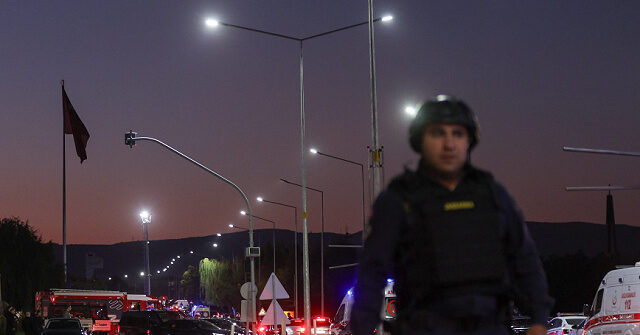On Wednesday, a terrorist attack occurred at Turkish Aerospace Industries (TAI), a key state-owned defense firm located near Ankara, resulting in the tragic deaths of four individuals and injuries to 14 others. The attack, which took place in the municipality of Kahramankazan, was marked by an explosion followed by gunfire, alarming witnesses and prompting a swift response from law enforcement. Turkish Interior Minister Ali Yerlikaya confirmed that two of the assailants, identified as a man and a woman, were “neutralized,” though he did not reveal whether additional suspects were involved. Eyewitness accounts and reports from local media painted a chaotic scene, with footage showing smoke rising from the facility. However, the Turkish government’s censorship board imposed a blackout on media coverage, and significant internet restrictions were reported in the aftermath of the event.
The TAI facility, a cornerstone of Turkey’s defense sector known for its advancements in aerospace and military technology, may have been targeted not only for its strategic importance but also due to the context in which the attack unfolded. The incident coincided with a significant defense and aerospace trade fair in Istanbul, alongside President Recep Tayyip Erdogan’s diplomatic visit to Russia for talks with Vladimir Putin. Observers noted that the timing could suggest a carefully orchestrated effort to undermine national stability amidst critical international engagements. Al Jazeera’s Sinem Koseoglu remarked that the attackers seemed to have had detailed knowledge about the TAI building’s layout, raising suspicions that the attack was strategically planned.
In the wake of the violence, President Erdogan publicly condemned the attack and expressed condolences, referring to the victims as “martyrs.” High-ranking officials, including Vice President Cevdet Yilmaz and Foreign Minister Hakan Fidan, echoed sentiments denouncing the attack. Fidan specifically emphasized Turkey’s commitment to countering all terrorist threats while bolstering national defense capabilities. The remarks from Turkish officials hinted at a possible involvement of the Kurdish separatist group PKK, with Defense Minister Yasar Guler suggesting an anticipated involvement during a press conference. The intensity of this response reflects the broader political landscape in Turkey, where national security concerns often intersect with political maneuvering.
Intriguingly, the attack may also have been influenced by Erdogan’s recent overtures to the Kurdish population regarding peace negotiations. Days before the attack, a prominent politician allied with Erdogan implied the possibility of parole for Abdullah Ocalan, the imprisoned PKK leader, contingent on certain political outcomes. This unexpected suggestion suggested a potential shift in Erdogan’s approach towards the PKK as he navigates complex negotiations for constitutional changes that could allow him to run for reelection. However, such a strategy could have alienated hardline factions within the PKK, whose retaliatory actions in the form of a high-profile attack could serve to complicate Erdogan’s political calculations.
The background dynamics of this attack further unfold in the context of shifting alliances and Erdogan’s attempts to engage with different political factions in Turkey. The proposition regarding Ocalan’s potential parole was perceived as an effort to garner support from pro-Kurdish parties amidst a fractious political environment. Yet, this outreach to the Kurdish constituency might also resonate as a threat to more radical elements within the PKK, resulting in an attempt to assert their presence through violent means. Such a high-profile attack not only sends a message to Turkish authorities but also complicates Erdogan’s ability to pursue conciliatory policies while maintaining his base’s support.
As investigations continue and the political fallout of this attack is assessed, it is evident that it resonates deeply within the overarching turbulence facing Turkey. The attack on TAI stands as a chilling reminder of the persistent threats posed by terrorism and the complex interplay of domestic and international politics. Erdogan’s administration now faces the dual challenge of responding decisively to secure public safety while also navigating the delicate web of political alliances that dictate Turkey’s future trajectory in a rapidly changing geopolitical landscape. The implications of this attack will reverberate through Turkey’s defense policies, internal politics, and broader regional security dynamics in the days and months ahead.

